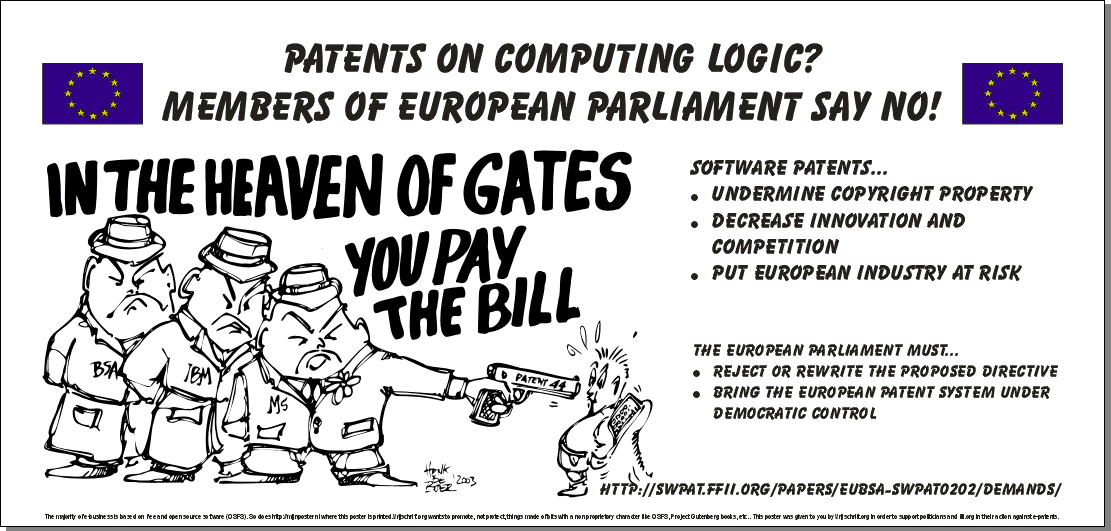|
unwilling revolutionaries some time ago, i expressed some of my feelings in reaction to a great essay i happenned to read. this time, in reaction to a not so great piece by adina levin in which she subscribes to the error of equating marxism with centralisation, i'll elaborate on it. do you think that all those reformist critics of copyright (ie. lessig) really get it? Is "fair use" going to make things more fair? Or is it, as Johan Soderberg argues in reluctant revolutionaries - the false modesty of reformist critics of copyright, that any sensibly guided reform in intellectual property law will inevitably result in the collapse of the entire property system? That is so, according to Soderberg, because we can't and we shouldn't distinguish between intellectual property and material property since both result from a given production process in which living labour is involved...but this is only the departure point upon which the author formulates his novel argument. I'm afraid I won't do justice to Soderberg's argument were I to go on explaining why reform in IP law based upon the "fair use rhetoric" will shatter the property system, but long story short, the core of the argument is: in a time like ours that the best part of the production of economic value has migrated to immaterial products and cultural production (like those offered by the entertainment, culture industry, etc), and whose production is dependent upon "cognitive labourers" and end-users for customising those products, any reform in IP law toward "weaker protection" will pave the way for a cyber classless society which will gradually infiltrate the rest of society and economy. This and many other issues are critically examined in the essay. When you finish reading it though, you may not agree with everything said, but some of your previously held views will be shaken. There're several things that the current discussion over intellectual property has failed to stress, namely that for both intellectual property and material property to exist someone has to put a fair amount of work as input into the production process from which this "property" emerges. Intellectual property is an idea, I agree, but on the other hand, who can deny that thousands of manhours have been put into the manufacture of Linux, for example? This is the aspect of paramount importance, according to Soderberg because it is this labour process which gives rise to a given state of class struggle, by which, in turn, relations in society are being determined. Further, none said, and surely not Soderberg, that the entire prorety system will collapse if we stop distinguishing between intellectual and material propoerty. In fact, Soderberg is adamant that this distinction will persist in one way or another. Nevertheless, and regardless of this distinction, the property system will collapse, says Soderberg, because a reform in IP law will lead, gradually, yet, eventually, to an awareness that if intellectual property can be used fairly and freely by different people, and it is this very same intellectual property that the market system is so dependent upon for its survival, then why shouldn't material property be used fairly and freely too while at the same time not being tied to a single proprietor? The process through which Soderberg arrives at this syllogism is as follows: 1. In the current state of capitalism, the lion's share of economic value stems from the manufacture and sale of entertainment and cultural products like software, ideas, lifestyles, brands, movies, and so forth. 2. for these entertainment/cultural goods to be developed, a worker has to use his brain rather than his brawn. It's the creativity of the worker that determines the actual value of the end product. 3. Apart from the worker himself, end-users are more and more involved in the actual production process. End-users tailor these goods to suit their needs and wants and increasingly the market system is being reconfigured to take advantage of end users' input and creativity. 4. A strict IP regime is counter-productive to what the current (capitalistic) economic system needs or thinks it needs (because a strict IP regime discourages end-users from contributing). Thus, it becomes probable that the current system itself will ask for a restructuring in the IP regime. 5. ...the IP regime changes. 6. Workers and end-users become self-aware of the role played by IP, and en masse proceed to restructure the "material property regime" accordingly. Also, the moment we start distinguising between material and intellectual property is the moment we set the door open for metaphysics. And I, as Soderberg, do not wish to discuss metaphysics in the context of this discussion. I understand the difference between rivalrous and non-rivalrous goods. Traditional economic theory says that the former should be organised in a market (since the use of a rivalrous good by one person excludes another person from using the same good) whereas the former should be organised in a commons (ie. the use of a lighthouse by a ship doesn't and cannot exclude another ship in the viccinity from using the same light emitted by the lighthouse).....but while this theory holds to a certain extent, and it surely explains why IP should be organised in a commons (since my using a certain piece of software doesn't exclude anyone else from using the same software), it doesn't shed light upon the changing dynamics of the social relations in production that will manifest once IP is organised within a commons. And last, law doesn't shape society - society shapes law. And today, we witness a conflict between what society needs and what the law mandates. This conflict is most evident among all of us involved with some aspect of IP. 4:25:29 AM |




